Andy Moor, guitarist in The Ex since 1990, lives in the Netherlands; his adopted home ever since he accepted the invitiation from The Ex to join their ever-changing ranks. I have been a fan of The Ex since high school, which means I have been a fan of theirs for (ahem) quite some time. The Ex are playing at the Black Cat tomorrow night and I thought it would be a fine opportunity to interview Andy about one of my favorite bands.
The first time I tried to call Andy, he was sleeping off jetlag having just returned from Addis Ababa. The second time I tried to reach him, he was out for a bike ride. The third time, he was on a boat ride with visiting family. I guess that’s what I get for expecting a so-called “anarchist” to stick to a schedule! Andy and I finally connected via Skype on the fourth try and we proceeded to have an epic conversation about some of Andy’s side projects, The Ex’s rich history of collaboration, the recent departure of G.W. Sok (the group’s lead singer for 30 years), the band’s excellent new album “Catch My Shoe”, and that pesky “anarcho-punk” label that follows The Ex everywhere, much to their chagrin.
Michael Darpino: Do you still go by Andy Ex, or is strictly Andy Moor these days?
Andy Moor: (laughs) Strictly Andy Moor. It was actually only the very first project that I did outside of The Ex, the first time I did a project outside of The Ex, which was this band called Kletka Red. At that time we were trying to figure out what to call ourselves, because with The Ex we were all just called by our first names. So I just didn’t really know what to do, because with Kletka Red it seemed strange to just write “Andy”. So we thought okay let’s just call ourselves Andy Ex, Luke Ex, Terrie Ex, and so on. But after that I also thought this is a bit strange, because I don’t want to be in the situation in say five years where I’m not in the Ex anymore and I’m still called Andy Ex, which is the situation Luke Ex is in at the moment. He’s actually the only one still called “Ex” and he’s the only one who isn’t in the band! So I just decided to call myself Andy Moor, and for the first couple of CDs I made after that, nobody knew who it was.
MD: Well there is also the electronic music producer Andy Moor, do you ever run into people confusing you?
AM: Yeah, yeah a lot. Yeah the techno trance DJ yeah.
MD: Pretty huge style difference there…
AM: (laughs) He wrote me and he said that sometimes when he plays, it’s written in the program that he also plays guitar. So people sometimes get us confused, but it’s okay. It’s not too serious.
MD: Well one of my later questions was going to be about Kletka Red, so I’ll just jump t that one. Is that project over or is that something you guys hope to revisit someday?
AM: Yeah, we stopped it quite a long time ago. We had really great gigs and we made two CDs. And musically I thought it as a great experiment. And really fun playing with Tony Buck. I always love playing with Tony. He amazing. But we just had sort of a, personal difficulties, you know more private things. And it just, in the end the energy we were putting into it was more than we were getting out of it. It was a bit chaotic and destructive, so, we decided to…all of us were so ready to do other things, we just thought we should do other things. It’s a shame, because I really really liked the band a lot. The music was a really good combination of people.
MD: Well the live performances have a great reputation and although I never got to see Kletka Red perform, I know people are interested in the project.
AM: Yeah, it’s a shame. But that’s what happens sometimes.
MD: Moving on to The Ex. The band is still often described as an anarchist band.
AM: (laughs) (mock screams in terror) (laughs)
MD: With the band having such a long history. Going through so many different periods. I wondered if you would want to go on record. Do you still consider yourselves and anarchist band?
AM: Well, I think we never called ourselves an “anarchist” band. I think that was a name that was inflicted on us by probably fans and journalists. It probably came from the fact that we released this double 7″ single called “The Spanish Revolution from 1936”, that’s probably where it started. But before that The Ex were considered a punk band. So when we released that we became an anarcho-punk band. But we never ever thought of ourselves like that. Of course we were totally into that revolution, and sort of their anarchist philosophy, but we are also into many many other things. It’s quite a multi-pluralist sort of group, with lots of ideas. So we don’t have a need to give ourselves a label like that at all. And we never have.
We’re really into African music right now, but we don’t call ourselves an Ethno-world Afro-band or something. That’s not really our interest. So for us it’s kind of annoying that people…well, that was one of the first labels we got and first labels tend to stick I think. 33 years later, or 32 years later, and people are still describing us like that. It’s not because we’re against anarchism, it’s just when you label a group you end up sort of limiting your audience. Certain people will look at a description like that and think “oh this is an anarcho-punk band” and they won’t come to the gigs because they aren’t interested in that.
MD: This is why I wanted to ask this question. I have been a fan of the band for a long time and anarcho-punk didn’t seem like the most accurate description of what the band has been doing for some time. So I appreciate that answer.
AM: Yeah well, sometimes when I say that, journalists tend to say, “Well, what? You don’t believe in anarchism?” or “well, you’re giving up on your punk ideals.” And that’s sort of rubbish. It’s got nothing to do with that. We never defined ourselves in one style. We never have, we just made our music, and went for our interests, and those interests have grown, have become much much wider than being only an anarchist group or a punk group or something. People that like us are also interested in many different things.
MD: I have a question specifically about the “1936: Spanish Revolution” release. Mainly, because it is one of my favorite releases; it has beautiful packaging and of course great music. I was wondering where the idea came from to do a release like that, packaged that way? How was the accompanying book of Spanish Revolution photos put together? Where were all those amazing images found?
AM: That came from a guy called Johannes. Another singer of the band at the time. And he was really interested in that period of Spanish History. He was kind of studying it in depth, and he found this archive of photos in Amsterdam in a library. And so, I think we started from that. He found these photos and he found the stories behind them. So they decided to make a package, make a book, with music. And in a way that is the way The Ex has always done it. Getting this kind of burst of inspiration, and then you sort of create something from it. I think that’s where that grew from. For me playing with Getatchew Mekuria, the Ethiopian saxophonist, for me that is as anarchic and as in the spirit of anarchism or freedom or whatever you want to call it, as releasing that 1936 Spanish Revolution single.
Getatchew he has such an incredible free spirit, he’s so open-minded. He’s a 74-year old Ethiopian saxophone player. He actually played in a police orchestra, and then a big band, and now he wants to play with a bunch of Dutch guys playing loud guitars. I think that’s amazing. It’s like he’s the one, he’s got the true anarchist spirit, in that sense. He’s completely wide open. It’s taking risks and trying something at the age of 74. So I think it’s more to do with the spirit when you release something, the energy the ideas you put into it. And at that time it was because the singer was really, really interested in this archive. So it was a great moment and it was also a great moment in Spanish history where something really incredible could have happened.
MD: It is really great to have a moments of true inspiration like that.
AM: We just saw him. We were just in Addis last week and we saw Getatchew. He’s in great shape. He invited us to his house and we had a big feast. And then he played with us, two concerts. We played in a school for about 5000 school children. They’d never seen us before and they’d never seen him before, even though he’s a sort of veteran saxophone player and a legend in Ethiopia. All of these kids hadn’t seen him before because he doesn’t play very much anymore. So it was amazing, all of these kids, they knew who he was and suddenly they could see him. It was free, it was free admission. And he played usually where they play football, on their playing field suddenly Getatchew Mekuria was playing.
MD: That sounds fantastic.
AM: Oh yeah, it was wonderful.
MD: How much time does The Ex spend in Africa? Is Ethiopia the main center of African music that you focus on? Or do you travel around?
AM: Well, no actually, we listen to a lot of African music from many different countries. We have for about 20 years. It’s not a new thing for us. It’s just in the last few years the music has really infiltrated our music. But we’ve been listening to African music since the late 80’s. We go to Ethiopia once a year, usually for about ten to fifteen days. We’re not spending like half the year there or something. We go every year with a project, we bring musicians with us. Sometimes The Ex plays, sometimes we go with the other musicians. We try to do something every year, do a couple of workshops.
MD: Getting back to The Ex and politics. Does the group generally agree on politics? If not, I could imagine there being some fiery debate among you when you do disagree on a political position.
AM: We mostly agree, strangely enough. I mean we’ve known each other a long time also. So we’ve, a bit, been through the same struggles and frustrations with living in Western Europe. And also, when you go to Ethiopia, you also see the contrast and the difference. But that would be a whole other chapter to start talking about that. But I think we have a basic level where we agree politically. And Arnold, I think Arnold, the new singer, expresses it very well in his lyrics. And he doesn’t do it directly, in a flag waving way. But he gets his message across. When we asked him to join we didn’t give him a sort of political check-up to see if that was correct. We invited him because we liked him as a person and we liked his music.
You tend to, your friends in general, not always, often share similar political views. I don’t know many friends who are a big fan of George Bush, I just don’t. I have family that are more like that in their way, I have great discussions with them about it. For us, we don’t really consider ourselves a political band. I mean politics is part of it, but it is a part of life. Improvising is also part of it. And staying open, and keeping a sort of spirit. All of those things requires work and energy, constantly, but it’s not like we consider ourselves, like we want to be a radical left-wing hardcore noise band or something. The energy comes from a love of the music in the first place. And the desire to transfer our energy into the crowd. To make great live music, that’s really the first impetus of it.
MD: Well, you’re certainly achieving that. The Ex is one of the best live bands I’ve ever seen.
AM: That’s what we think about, when we go into the rehearsal space. We think about how to make a new live set, we don’t think about how to make a collection of things called songs. We are really thinking about how to make a great live set of music. And then later we have to think about recording it and making it into a CD. But the first impetus is always to play it as live music.
MD: When you come to perform at the Capital of the United States, considering the band’s politics and U.S. Foreign Policy for the last decade, does it sometimes feel different playing in Washington DC than playing in other US cities?
AM: When we travel through the States, basically we are travelling in a van, we have to stop at a horrible Denny’s or awful service station to drink a coffee at the side of the road, we arrive in a venue where we get greeted by usually a very friendly promoter, and then 200 or 300 people who really like our music come and watch us play. So our experience of America is actually quite amazing because of that. We’re travelling in a kind of tunnel because of that. We don’t have the time to stop and really, really…I mean we talk with people a lot about politics while we’re there. And we ask them how it’s going. And we learn a bit about how people are feeling about what’s happening in the States. But, our experience when we’re there touring, is a really positive one because were there to play music that people come to listen to.
It’s very different when you go there to travel and explore or to live there. Then you really experience much more…but we do see a lot of things. In the last ten years we’ve seen changes in the States, I don’t know Washington DC better than any other city, but I’ve noticed changes. For me the level of fear in people seems to have increased overall. There was more fear since 9/11, but especially in the last five years. People seem to be more scared of things. The level of security all over the country has become ridiculous. Even in clubs. It’s becoming unbearable. If you need four big meaty guys; one at the stage door, one by the toilets, one by the front door, one by the back door. I think your asking for trouble.
Our fans never ever fight. Sometimes they get a little excited. Sometimes they get a little drunk. But most of the time they can take care of themselves. If one person gets out of hand, usually the other people in the audience take care of them. And I don’t mean like beating them up. I mean, just, make them go away. And when you have security people there, I mean the whole level of aggression gets much, much worse. Also in Europe, I don’t think it’s only in America, but we’ve had some pretty weird experiences with security. Sometimes with security in front of the stage. We actually refuse to play when they do that now. Well it gives such a brutal atmosphere; you have this band playing, you have these two guys standing in front of the band between you and the audience!
MD: This is interesting to hear from the perspective of a performer. It must create a barrier between you connecting with your audience.
AM: Yeah, it’s horrible. And it must piss the audience off something terrible. It’s really showing a lack of confidence and trust in the people coming to a concert. It’s like, these people can take care of themselves. Occasionally somebody gets out of hand, but it’s not like we have 400 hooligans just waiting to riot when we play. People are just coming to have a good time and listen to good music. They aren’t out there looking for a fight. Maybe you have one or two isolated…you don’t need a whole security…and the thing is we pay for that security.
MD: That seems to be the common reaction in American society, when one bad thing happens, the institution changes radically to react to one isolated thing.
AM: And the problem with that is that it is such a massive industry, that people make money from that. Like now, you have these incredible security companies that are earning millions and it becomes law. Now when you have a club, you have to have security. Before it was an option, if you wanted. It has to do with law, it has to do with getting suits. I think from that side, for us, on a personal level, to play, it’s become more difficult for us. And it doesn’t make us happy. We had it really badly in Boston not long ago. They were heavy with us because they didn’t know who we were. And that’s sort of strange. I mean you show your pass and everything but they had this aggressive attitude toward us. I mean we come all this way to play music, not to start a fight or something. This mentality, anyway…
MD: I want to talk a little bit about the band’s recent line-up change. G.W. Sok was with the band nearly 30 years! I wanted to ask first about G.W. Sok’s decision to leave the band. How did he break the news to you? How did you react?
AM: We broke the news to each other. It was a kind of a mutual thing that took a bit of time for both sides to realize. Slowly it became clear. So it wasn’t a big shock. It was a kind of gradual realization. I think, he kind of lost a bit of the excitement and inspiration. It cost him more energy to tour than he got from it. And from our side we felt like he wasn’t giving us the energy, and inspiration, and input. In a way it took longer than it should have. But that’s the way it is. We’re talking about someone who was with us for 29 years. It’s not that easy to suddenly stop. So it was a gradual thing.
And then we immediately thought, we’re not going to stop the band because of that. It’s not like he was the dominant force in the band. He was one element. In a way that’s the strong thing about The Ex. Everyone has such a strong input, that when one person leaves, it doesn’t mean the thing will automatically collapse. In a way the other three legs of the chair are completely strong still. So we just put another leg underneath. Arnold (de Boer) was a great choice. We knew him from this band Zea, we had seen him perform a lot. And he’s got this fantastic energy, he plays guitar, and he really wanted to do it. And he’s a good friend. That was enough good things. We were lucky to find him.
MD: The new album is very strong and supports that point you made about the band being able to sustain a change. Some bands fall apart when they lose someone who has been a member that long. I have to say, from a fan perspective, we were all a little concerned by the news but then mightily impressed by the new album and Arnold’s performance on it.
AM: Well that’s great. I think that the record reflects our feeling of relief. You know? That finally Jos (G.W.Sok) left, because that was a long process that took time and kind of was tiring also. So I think you can hear it in the music. And the way we play. It’s like a relief and an excitement because we have someone new in the band and it changes the whole chemistry and the balance of the musicians because there is a new person giving input. So it was really an injection for us.
For Arnold, it was also great. It is a completely new project for him and also an exciting one. So I think from both sides we have this spark of excitement. We feel like a new band. In a way we always had the feeling that this is how you feel each time you make a new set, whether you have a new member or not. You start from zero and you make a whole new batch of songs. So it’s kind of scary and risky because you don’t know if it’s going to work. And you can really hear that in your music.
MD: It is fantastic. I’ve been listening to it non-stop. One of the great aspects of seeing The Ex live is the speed and intensity with which you all play your instruments. The new album really captures the feeling of seeing you live, in a way that I am very impressed with. Was capturing the live spirit the intention of the new album?
AM: In a way we have been trying to do that for years with our records. (laughs) And maybe succeeding to a lesser or more degree. We don’t do too much over-dubs and production stuff. We tend to play the songs live in the studio, add the vocals, add a couple of over-dubs here and there, but basically what you hear is what you’ll also get at a concert. But I think this time, it worked so well. Partly because we worked with Steve again. Steve Albini. I mean we’ve done two, three records with him already. So he knows our sound, and he knows how to get it fast. How to set-up the mics. He had everything set-up so quick. He had us sounding good within half a day. We knew the songs very well, so we recorded very, very quickly. Then we took all the files away with us and mixed it at home. We had the luxury that we could spend a bit of time, basically we mixed it in my living room.
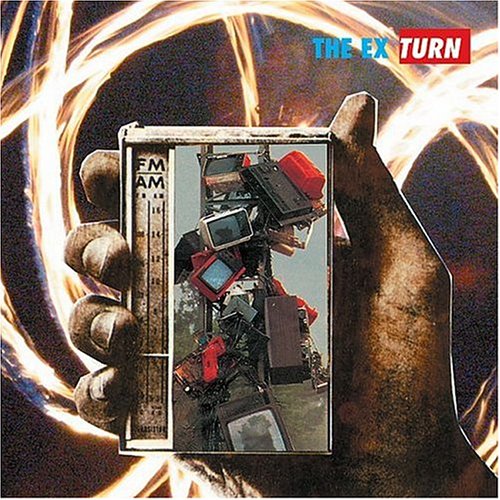 <
<
MD: So you recorded at Albini’s studio in Chicago?
AM: Yeah, we recorded on two-inch tape and then transferred it to digital files. And then mixed it in the computer in my room. Me and Arnold did. There we spent more time. We spent more time, we really tried to spend time getting the levels and balance and stuff. We had the luxury there that we could make a mix, everyone could listen to it, people make comments, we make another mix, that way we could reach it. Which was great, because when you’re in a studio you are under this time pressure because it’s expensive. We don’t spend a lot of money on our recordings, because we don’t sell large numbers, so it doesn’t make sense to spend weeks and weeks in the studio. But having the luxury to mix it ourselves, cut down costs, and really helped. So everyone was really happy with the recordings. Well, I didn’t ask Steve that…(laughs)
MD: He’s a bit of a perfectionist; I’d imagine he is always unhappy.
AM: (laughs) He gave us such good raw material to work with. It is unbelievable. When we first started listening to this stuff to mix it, the drums just sounded great before we did anything. We had much more to do with levels between instruments rather than having to do any big changes to the equalization. The way he recorded the instruments was fantastic. That’s what he does the best I think.
MD: I wanted to ask a couple of questions about you coming over from The Dog Faced Hermans. What was your experience like migrating from The Dog Faced Hermans to The Ex? Did that experience create pointers that you could give to Arnold to ease his migrating over from his band.
AM: I remember it being quite an easy transition, because I was amazed that actually, The Ex make their music in a very, very similar way to the Dog Faced Hermans used to make theur music. Which was, we would get together in a rehearsal space and it would be like a big experiment where nobody really knew what was going to happen beforehand and somebody would introduce an idea, and we would all react to it, and slowly build material. And it happens, the creative source of it is really improvisation. So, for me, when we started working I thought, “wow, this is very close.” There were different people, you know, with different tastes and different approaches, but basically it had a very similar atmosphere to the way of making music.
I think with Arnold it was very different because he, in his group Zea, he basically wrote everything. It was him and another guy, and her wrote all the guitar parts, he wrote all vocal parts, all the electronic parts, and this guy pressed the buttons for the electronic parts. So, he was the main creative source of the group. So, I couldn’t really teach him very much because, I didn’t have anywhere near the same experience that he had.
But I think he got it pretty fast because, he also, these people make their music together. Piece by piece and it takes a lot of time because of that. You have to remove things, add things; it can be a mess for a while and slowly the songs sort of take a shape. It’s a kind of slow, organic process. I think it works. In the long run it works better, because, once we learn to play the songs live, they become really, really solid and direct because of that. The sound, the most important thing, the way the sounds mix together; that really can only happen from playing the concerts live, playing the music live.
MD: So, with The Ex and The Dog Faced Hermans collaborations, particularly “Stonestampers Song”. That track is one of my all time favorites, I have to ask a question about it. So was it sort of The Dog Faced Hermans and The Ex all getting into a room and jamming like you were describing and then the song came out of that?
AM: No, actually “the Stonestamper Song” already existed; The Ex already had that song, they were already playing it live, and then they wanted to make an acoustic version. It was really a studio thing where we added instruments one at a time. You know, there wasn’t the real like, live collaboration thing. People would play one layer at a time and then overdubbing parts. They invited Dog Faced Hermans to add their parts to it. So it wasn’t very…uh, the same. We didn’t do that so much because it was two bands that had, in a way, such strong directions with their music. I think when all 8 of us would play together at the same time it would have been chaotic. You had two bassists, two guitars, two drummers and you’re all playing full on. So we never really did a big, sort of music jam together. Also, since I was in both bands for quite awhile, it was almost impossible to do that.
MD: What was the experience like splitting time between the two bands, because that did go on for quite a while?
AM: It was exciting, but it was difficult. Both bands wanted to play full on, full time. So I had to play double full time, and that was quite exhausting. But, I think I learned a lot about playing music from doing both. I think, when people ask me, which musicians have influenced me the most; I have to say, all the musicians in The Ex and The Dog Faced Hermans had the most, the biggest impact on my musical life.
MD: Another member of the Hermans came over to The Ex as a sound engineer for a while right?
AM: Colin. (Mclean)
MD: Colin, right.
AM: He’ll be with us on this tour.
MD: Yeah, I was going to ask if he was still part of The Ex family.
AM: He plays. Whenever we play with Getatchew Mekuria, the Ethiopian saxophone player, he plays bass. And, I also do a project with him, where I play guitar and he does live sampling and manipulation with electronics. We play together as a duo with dancers. He lives in Amsterdam and we’re still very busy musically together.
MD: Is that a live only collaboration or are there recordings of that?
AM: Yeah, we’ve got one CD of the duo. I have a label called UNSOUNDS and I release a lot of my side project stuff on that. It’s a whole bunch of different projects just over the years that I do outside of The Ex. I have to actually go quite soon. Arnold has an exhibition of his drawings tonight.
MD: Did Arnold write the majority of the lyrics on the new album?
AM: Most of them, yeah, I think, probably 90% of them. Some of the songs we’d been playing with Jos (G.W. Sok) of The Ex. As far as I know, I think he (Arnold) changed most of them. Changed the singing line, and changed the melody, and added guitar parts. He kind of transformed them into something else, so yeah, he wrote all of it.
MD: I saw you play at the Touch and Go 25th Anniversary festival a few years ago. During the set, it looked like one of you hurt your hand when you were playing, did something happen to your hand?
AM: (laughs)I can’t remember it. I know that was just when we were beginning to play the baritone guitar, since Luke, Luke X left the band, then we had Rose Mary for one period and then she left, then we didn’t really have a bass player. So instead of getting a new bass player, we decided to play baritone; the baritone, the baritone is just much heavier, like twice as heavy to play as a guitar. So, I think, these were the first gigs we were playing with the baritone guitar. I remember my hands used to get really cramped, cramped up.
MD: It looked like you were bleeding or something.
AM: No, that was Paul. No, that’s something else! That’s Terrie! He always bleeds; his frets, his guitar is about 75 thousand years old, and all the frets are sticking out of the wood and they’re really sharp. He keeps filing them down, but then they get, the wood, I don’t know, so every few gigs he cuts his hands up. (laughs) He heals very fast!
MD: So, that’s a regular thing then for him?
AM: Yeah, yeah. I always think that he seems to have this super regeneration power where his fingers…so the next day all the cuts and all the everything’s gone. It’s like these movies where they cut themselves and within ten minutes it’s completely healed. I don’t know how he does it. He’s got a really good immune system.
MD: (laughs) Terry’s the Wolverine of The Ex men.
AM: Exactly! (laughs) He’s quite amazing. And he’s 56! (laughs).
MD: He’s been doing it so long, maybe he’s evolved to have this healing factor.
AM: (laughing)
MD: Thank you very much for taking the time to answer my questions.
AM: See you in Washington.
The Ex
W/ DJ/Rupture & SPRCSS
@ Black Cat
3/12/11 – 9pm
$15
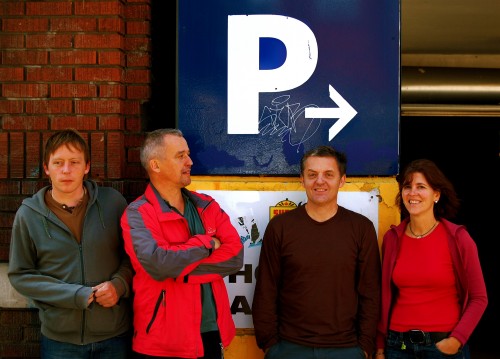
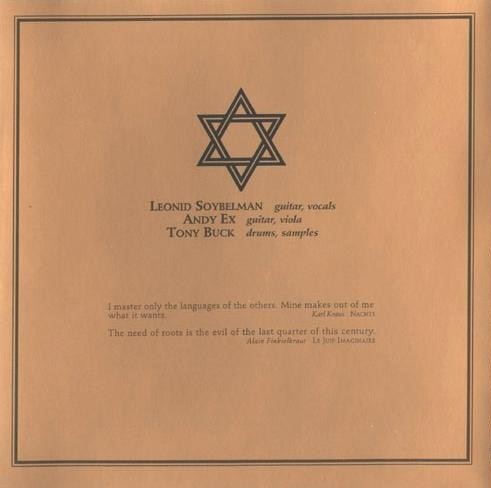
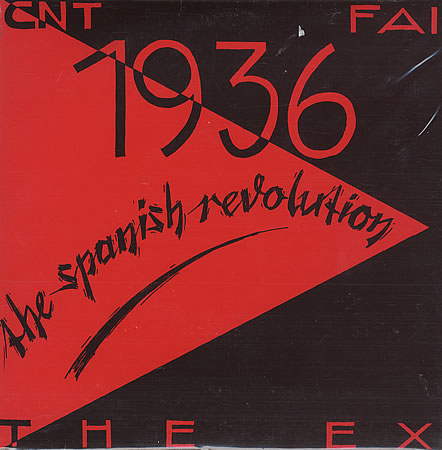
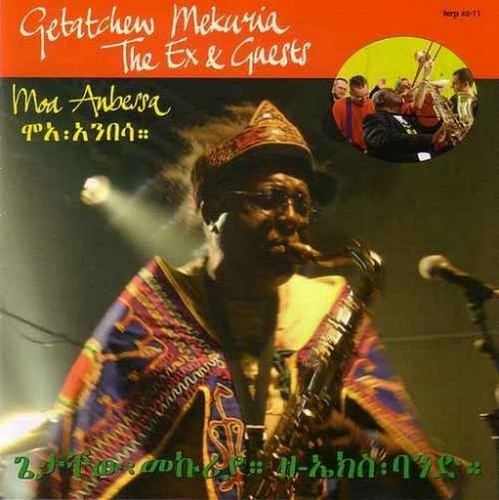

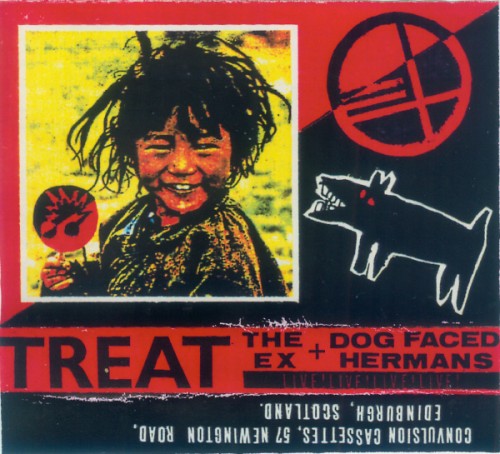
Pingback: We Love Music: The Ex @ Black Cat, 3/12/11 » We Love DC